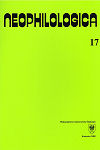Morphème opportuniste et lexicalisation d'inférences: la préfixation négative "in-"
The negative prefix “in-“
Author(s): Denis ApothélozSubject(s): Language and Literature Studies
Published by: Wydawnictwo Uniwersytetu Śląskiego
Keywords: the prefix “in-“; negation; adjective; allomorphy; superlative; the position of an adjective
Summary/Abstract: The use of the negative prefix “in-“ in the French language is extremely complicated. In most of the cases this prefix assumes the form of one of the three complementary allomorphs but there are two exceptions from this rule. Many “in-“ derived adjectives lexicalize the superlative value (irremplaçable) on the semantic level, which results in almost systematic polysemy between the compositional value (usually the negative one) and entirely or not entirely non-compositional one (the superlative one). The author of the article proved that the oscillation between these two values influences the position of an adjective in a nominal syntagm. In order to reveal a connection between the lexical negation and the superlative value the author formulated the pragmatic hypothesis. The second analyzed exception concerns the allomorph of the prefix “in-“, [i-] which is an example of a formal modification. This modification results from the presence or the lack of the superlative value (e.g. “irremplaçable” vs “inremplaçable”). This situation causes the appearance of the phenomenon called here "morpheme opportuniste" (the opportunistic morpheme) which allows the adjective to regain its structural meaning.
Journal: Neophilologica
- Issue Year: 2005
- Issue No: 17
- Page Range: 84-95
- Page Count: 12
- Language: French

